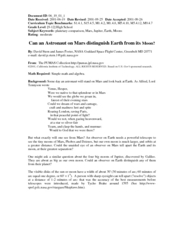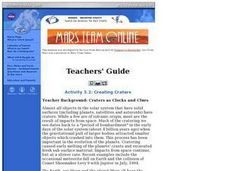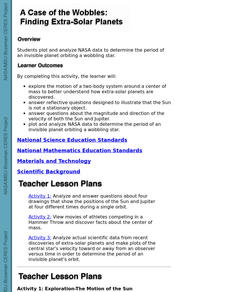NASA
Collecting Electromagnetic Radiation
Astronomy is literally over your head, but this lesson will explain how we study it. Young scientists make telescopes, calculate and compare the light gathering power of lenses, and simulate detection of infared radiation. Materials...
Laboratory for Atmospheric and Space Physics
A Classroom Solar System
Create a scaled model of our solar system in your classroom! Scholars work collaboratively to build paper mache planets and hang them in their proper position to showcase each planet's location in the solar system.
Curated OER
A Model Solar System
If Earth is modeled by a grapefruit, what planet could be represented by a golf ball? This activity uses everyday and not-so-everyday objects to create a model of the Solar System.
Curated OER
Minor Roman Gods and Goddesses Part 1
Each of the ten questions on this quiz ask to identify a Roman god or goddess who may not be well known. Go a little deeper than the oft-read mythology and expand your learners' understanding of the Roman characters involved. All...
Curated OER
Sky Watching
Students complete night-sky observations to understand how our knowledge of the sky has been enhanced by telescopes. Students complete a timeline worksheet giving the history of telescopes. Students then then make their own observations...
Curated OER
Scale Model of the Solar System
Lead your class through the procedure to create a scale model of the solar system. This resource reinforces concepts of scale and the mathematics involved, as well as the planets. Attach paperclips and staples to index cards to show the...
Curated OER
Greek Myths
Ever wonder why the ancient Greeks had myths? The explanation you'll find here, describes myths as stories that explain things people didn't understand. They also tell the stories of the gods people in ancient times believed in. These...
Curated OER
Fractions in Space
In this fractions in space worksheet, students solve 4 problems where they find ratios of orbit periods of satellites, they find the ratio of Neptune's and Pluto's periods, they determine the location of the planets after 5 opposition...
Curated OER
The Outer Planets
In this planets worksheet, students research the diameters and sizes of the planets. Then student will create scale model sizes of the planets out of cookie dough. Students complete 5 short answer questions.
Curated OER
The Io Plasma Torus
In this plasma torus worksheet, students solve 5 problems including finding the dimensions of the Io torus, determining the formula for the volume of a torus, finding the actual volume of the Ion torus and finding the amount of sodium...
Curated OER
Can an Astronaut on Mars Distinguish Earth from its Moon?
High schoolers explore the possibility of being on Mars and being able to identify the Earth. In this space lesson plan students complete a set of calculations to see if this is possible.
Curated OER
Solar System
In this online interactive Solar System worksheet, students access a specific website to locate the multiple choice answers to 4 questions dealing with the Solar System. Students answer 3 short answer questions and draw a line connecting...
Curated OER
Our Changing View of the Solar System
Students identify and name the eight planets and the five dwarf planets in our solar system. In this space science lesson, students view a slideshow of the planets and label them on an included Solar System chart.
Curated OER
Creating Craters
Students explore parts of an impact crater and compare and contrast craters found in Earth, the Moon, and Mars. Crater formation is modelled and the relationship of mass, velocity, and size of the projectile to the crater formation is...
Curated OER
How Fast Does the Sun Spin?
In this rotation of celestial bodies worksheet, learners determine the speed of the sun's rotation and they determine the number of days it takes the sun to rotate once at the equator. They identify the geometric factor that causes...
Curated OER
Out of this world! 2
In this solar system worksheet, students fill in the blank to sentences that refer to the solar system. Students fill in 15 blanks with planet names.
Curated OER
Measurement of Biotic and Abiotic Objects
Students identify biotic and abiotic factors. In this environmental study lesson plan, students conduct a series of experiments to collect and record data and draw conclusions based on the results.
Curated OER
Lost in Uruguay
This quiz on the culture and geography of Uruguay may serve best as a sponge activity for those who have finished an assignment. Questions are multiple-choice, and each correct answer is worth 15 points. Quiz-takers must earn 1000 points...
Curated OER
Finding Extra-Solar Planets
Students plot and analyze NASA data to determine the period of an invisible planet orbiting a wobbling star. They explore the motion of a two-body system around a center of mass to better explain how extra-solar planets are discovered.
Curated OER
Fly Away Moon Experiment
In this fly away moon experiment worksheet, students follow the procedures to demonstrate the effects of gravity on the earth and the moon.
Curated OER
Space Exploration to Find Habitable Planets
Learners explore space science by reviewing scientific vocabulary terms. For this planet identification lesson, students identify the nine planets in our solar system and discuss which ones could potentially harbor life at some point....
Curated OER
Large Numbers- the Planets
In this writing distances instructional activity, students re-write the chart to show the distance each planet sits from the sun using words rather than numbers, all measurements are in km.
Curated OER
Out of This World 1
In this planets research skills worksheet, learners use their research skills to fill in the blanks in 15 sentences regarding the planets.
Curated OER
Remote Sensing - What Can We See When We Can't Touch?
Learners discover how remote sensing is used to identify the signatures of life even when the particular life form is not directly observable. They investigate how a satellite "sees" objects on the surface of Earth.

























